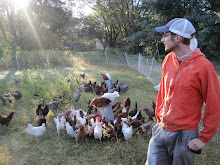Friends-
An entire sky of rain has settled over the farm today, and I'm celebrating by pouring down my thoughts. Rain makes you look out the window and see more than just grass, chickens and trees - but all of them, woven together within a texture of life which is creations magnificent gift to us.
Being from Iowa, at a young age I was constantly told that farming the land was hard, dirty and poor-paying work. Farms were gigantic acreages managed by one man with a squadron of expensive green machinery. I only came to understand later that this was all part of a national shift in agricultural practices manufactured by corporations like Monstanto, Cargill and DuPont, whose Capitalistic principles caused the average amount of land worked by farmers to balloon from 50 acres, in 1950, to 200 acres in 2000.
The traditional farming culture that made such hard work sustainable through creative, humble, and principled living, was soon destroyed by an economy designed for the benefit of CEO's and bosses. In a shamefully short series of decades, the 10% of the U.S. population once involved in agriculture in 1950 plummeted to less than 1% in 2000. Today, there are more blacks imprisoned in the United States (2.1 million) than there are farmers (900,000).
We have created a wasteful and unfair system of production which pits farmers against a board of directors whose profit margin forces them to produce as much food for as little pay as is possible. No wonder the majority of the world's youth want nothing to do with agriculture. As it is currently organized, it degrades both human and soil health; replacing once rich and independent rural cultures with a way of life founded on the exploitation of the land and those who work it.
Enter the screwdriver. Recently, while Elliott and Ari-Anne were off the farm, I was faced with the task of removing some tin roofing from one of our pastured broiler pens. While digging through the shed for enough extension cord to reach the opposite side of our pecan orchard, I found the perfect Phillips head screwdriver in a pile of cobwebs on the shelf. The sun was beaming strong and the air was crisp and sweet, so I said, "why not?"
Instead of lugging a power drill along with 100 foot of cord, I stowed the humble screwdriver in my front overall pocket and enjoyed the stroll across the orchard. While working, I felt the aliveness of birds, grass, trees and clouds. Rather than an electric drill whirring, I sung along with mocking birds. Instead of the hasty and begrudging attitude which typically accompanies work in our culture, I passed a quiet 10 minutes twisting my arm, feeling that delightful tinge of muscle pain that lets you know you are getting stronger and using your body well.
That one simple choice taught me that working with the body is a joy; as opposed to burdening it with resource-intensive tools that often do more harm than good. Now to be sure, the drill is a welcome innovation on the farm most of the time. But in the context of the problems facing agriculture in my home and across the world, I use the screwdriver as a metaphor for the potentially most egalitarian solution that we have.
The tools and people exist right now around you to create a community independent of exploitation. Despite the hegemony of Capitalism over our lives and food, we are still truly powerful. They depend on a divided and disorganized rural culture, one that values money over real, authentic life. Its up to us whether we will give it to them or not.
Let's replace their destructive and wasteful machines wherever we can with creative, intelligent and dedicated bodies. Let's organize the production of food such that it not only brings a viable economy and culture back to the countryside, but that it also be nutritious, shared, and most importantly, part of a design for life which recognizes the fullest potential the human body has for meaningful labor.
For now that looks like poultry for us. Though simple creatures, the culture which market forces have created around chicken products is extremely complex. Ever since the 1980's, corporations have been contracting more and more factory farms to mass produce chicken. And as before, the farmers work for extremely low wages, and so to scratch out a living must produce an extremely unreasonable amount of product which the corporations then turn around and sell at unrealistically low prices. Thus everything related to chicken (eggs, meat, by-product, etc) has been cheapened to an extent that for us to make a respectable living raising poultry is tough.
But we do it anyway. And despite an increasingly stale political atmosphere, we have freedom enough to make our food the way we want it to be. There is no better way to begin a long term process of transformation than to build a well nourished community.
Our dream is to care for the soil, care for our relationships, and determine how to share the bounty. Join us as part of a growing generation emboldened to live lives of real substance, importance and health.
-Mark B.




